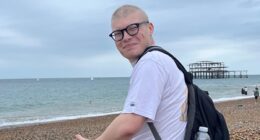I thought having a baby might turn me into an ‘elite sleeper’. I was wrong

Scientists have found 3% of the population need less shut-eye than the rest of us. Could I train myself to be one of them?

I don’t want to boast or anything, but I have always considered myself something of an elite sleeper. I love sleeping more than just about anything. Given the opportunity, I will sleep for marathon stretches and can snooze through even the most extreme situations. On one very choppy ferry crossing on the notoriously rough route to the Isles of Scilly, for example, my travelling companion spent the entire three-hour ride throwing up in the bathroom while I dozed happily on a plastic chair.
Unfortunately, it has come to my attention that I am not an elite sleeper after all. It seems I am just lazy. Or, possibly, a high-functioning narcoleptic. Because, as it turns out, neurologists have been studying actual “elite sleepers” for years and they are defined as the approximately 3% of the population who are biologically programmed to need less sleep than the rest of us. According to a study that came out in March, elite sleepers have rare genetic mutations, which means they can sleep fewer hours than mere mortals without any risk of cognitive decline – excitingly, they could hold the key to a future cure for dementia.
READ RELATED: $9-a-tablet drug used to treat HIV patients could help reverse memory loss
It may not be possible to strategically mutate your own genes, but can you train yourself to need less sleep? Is there a non-biological way to reach elite sleeper status? I have spent the past year trying to answer that question. Not for fun, I should add, but because having a baby has severely disrupted my passion for snoozing.
For a while, I thought a new baby might mean a new and improved me. Since you can’t hit the snooze button on a child, I assumed I’d be forced to become one of those people who jumps out of bed at the crack of dawn ready to seize the day. After a year of tough scientific study, however, I have discovered that eliteness eludes me. Being someone who is forced to get up early in the morning, it turns out, is very different from being a Morning Person.
-
Arwa Mahdawi is a Guardian columnist
Source: Health & wellbeing | The Guardian







